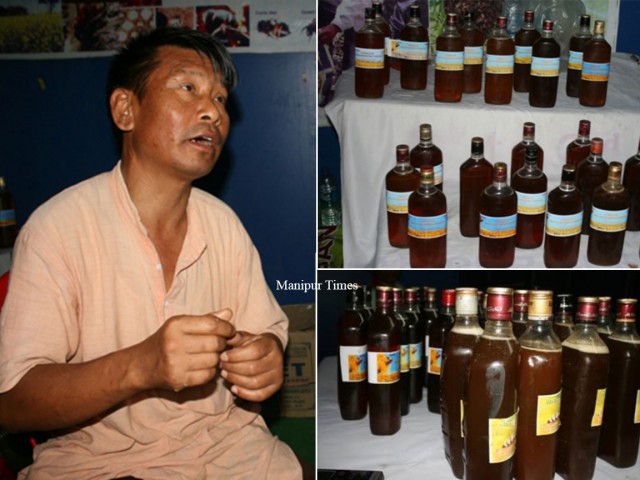Bee-Keeping is a thriving business can equally fetch a good income for a farmer who cultivates one Hectare of paddy field just by taking up honey bee farming with 15 bee boxes. In fact, a bee box can give 15 to 20 litres of honey which is sold at Rs 250-350 a litre. If a Bee Keeper keeps 100 or above bee boxes, the income he can earn from the business is unlimited. For a bee farmer, limit of earning depends on his effort. Interestingly, since bee-keeping requires less time, investment, manpower and infrastructure, one can take up bee farming comfortably and successfully if he has good work culture. “If we can expect unlimited income, then why should we not take up such business”, says bee farmer Yendrembam Sarat.
Yendrembam Sarat born to Y Tombi as eldest son hailing from Changangei is a professional bee keeper who has been taking up Bee farming for the last 15 years.
“With only four- five bee boxes installed in my farm located at Changangei, I initiated bee farming as a hobby. Later on, I determined to convert the hobby into a professional bee farmer with the business giving me a comfortable income to maintain my family. More bee boxes were placed in the farm so as to increase honey yield with the help of Horticulture Department, Government of Manipur. Now, I am producing honey from 50 bee boxes. Life was hard and difficult before taking up bee farming, Now it has supported me a lot”, he said.
Each bee box comprises 7 to 8 hives which can harvest around 15 to 20 bottles of honey in a year during the flowering seasons of Monsoon and Winter by extracting 10 to 15 times. Honey harvested during monsoon season is known as Langban Khoihi. Winter season gives best quality honey and good yield. “Honey bee farming gives me a good turnover enabling me to maintain my family comfortably”, said Sarat.
He said that for taking up Bee Farming, one does not need to incur huge investment for procuring costly machineries and tools while other manufacturing industries require huge investment, costly machineries and heavy manpower. With some small wooden bee boxes costing Rs 1200 to 1500 a piece and a honey extractors with filtration facilities costing Rs 5000 or so, one can initiate bee farming venture. Bee farming has now been a thriving and lucrative business which anybody can take up without much investment and manpower.
Pollen and nectar that come from the flowering plants are the main raw materials for bee farming. Both wild and cultivated vegetation in Manipur constitute an immense potential for bee farming enterprise as these plants are the major or minor sources of nectar and pollens, he said.
“Bee keeping is an art. A bee keeper can communicate with his bees. Bees know and do not attack their masters who takes care for them all the time once a mutual understanding and close relation is built up between the bee keeper and the bees. When enemies like ants, cockroach, reptiles, birds, spider, Ngarenkhoi etc. are about to attack their home or they feel uncomfortable to live in the Bee Box, Bees inform their masters for help. Bee keepers can psychologically learn what his Bees like through their gesture or behavioral change”, said farmers Sarat.
Bees prefer to live in the bee box made of Uningthou and Tera wood as these particular wood are neutral. The bee boxes should be kept neat and clean all the time not to allow ants, reptiles cannot attack them, maintained he.
In 2007, some like-minded bee keepers in Manipur united themselves and formed All Manipur Bee Keepers Federation with an aim to take up welfare activities of the bee farmers while endeavoring to increase honey yield. The federation has opened up its district branches in all the nine districts of Manipur with 75 Bee farmers each in every district. Under the umbrella of the federation, Bee Farmers in the state are producing honey to meet the honey demand of the state.
For the first time in the state, state level honey festival was held at Kangla to showcase honey products of the bee farmers in the state. Being the general secretary of All Manipur Bee Keepers Federation, Imphal West branch, Bee farmer Yendrembam Sarat is working to promote honey production in the state.
Since there is high demand of honey yield in the state, Bee farmers need not worry for market at all. The present local market value of raw pure honey ranges from Rs.200-350 a litre. The current gross honey yield harvested by the limited local Bee Keepers cannot meet the increasing demand of honey. Recently, one outside company has demanded the federation to procure honey products from Manipur. As such, bee keeping has now become a lucrative and thriving profession in Manipur. On the one hand, locally produced pure honey is not easily available at any time in the local Market other than Dabur branded Honey. With limited local entrepreneurs taking up bee farming professionally, honey demand cannot be met and the state hinges on other for honey. If the so called unemployed youths of the state take up bee farming which is a viable way out for self employment, they can make a good living with good income apart from contributing to the state economy by exporting the surplus honey yield to outside, he said.
He said that Bee Farming has positive ecological consequences. Bees play an important role in the cross pollination of many flowering plants thereby enhancing crop production to the tune of 20-25%, thus on one side increasing the yield of cross pollinated flowering crops all-round the year and on the other even landless farmers can take up for income generation from the sale of Honey and Wax. Approximately one half of the human diet is derived directly or indirectly from crops pollinated by bees.
Home Self-Employment Foods and Snacks Sarat – a farmer making friend with Bees to convert Bee farming...













Changangei maning leikaida
Add pibiyo
product se leige hairadi kraida fangdoino?
Mafam kadaida
Fangfam gi contact no paamjei
Kaka si changangei maning leikai dagini mimg sarat (near Ibudhau Moirangpokpa haraobam), aduga kaka gi thabak si henna fhanaba mym yaifha mamgol nimimnasi
Magi contact number amukta inbox toubirak-pa yagadra ?
Cdi ei bottles 4 gumbda pammi kadaida fangani amukta haibirko
Heigru makhong
Changangei maning Heihmgru makhong. Near Nerasent English School.
About 1.5 km opposite to Imphal International Aiport.
Phone number khanglagadi MT inbox ta amukta thabirak-o
8731989624 sarat ki no. Nimayam
Ngdi Sarat ki kanara?????
Contact no.pammi duga full address pamme hayengmak lakchage
Salute u sir
Address???
Full address amadi contact no pamjei
Changangei Heigru makhong…maning leikai. Opp.Imphal International Airport.
Soidana loi namjankhre Sao yade
Changangei maning leikai,kabui khun manakta
Soidrabo!? Darkar taiye….
Poujok Yeshito Yakuza Golmei soidre he akhoi oja ne,,
Pure khoihi ne ko!? Nang yum thotak paro!?
Poujok Yeshito Yakuza Golmei adudi khangdre he,thok te.echannupi da hango
Hoi hayeng hangey
Mafm haibirko
Mafam amada haibirku
Kaidano c Bo leijage